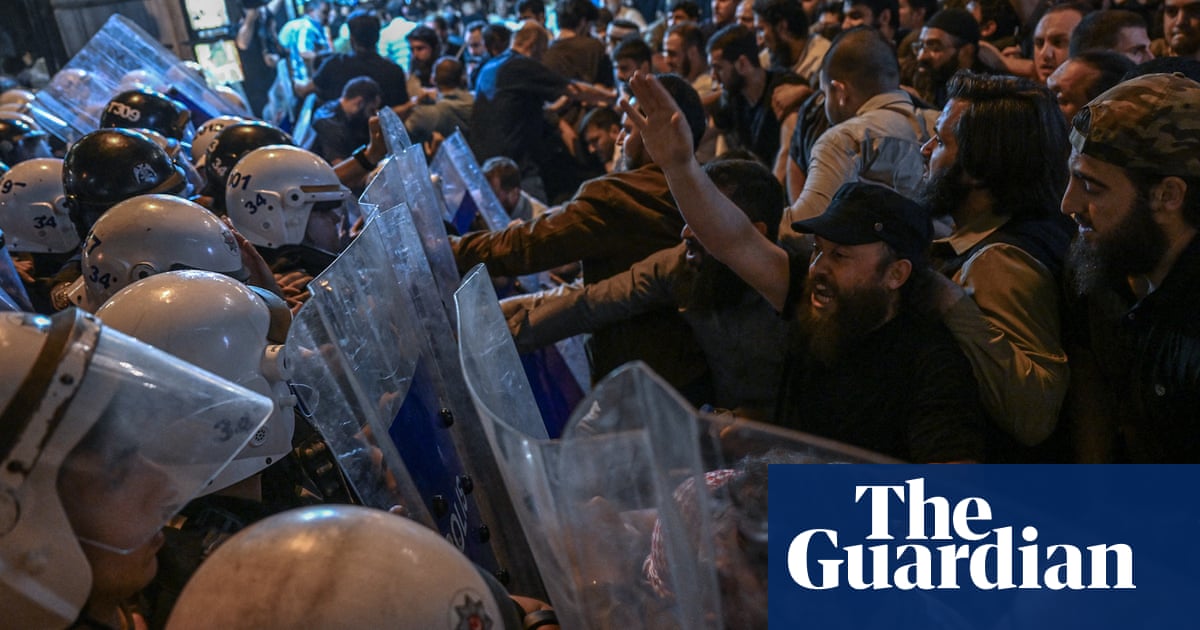Clashes erupted in Istanbul on Monday as police fired rubber bullets and teargas to disperse a crowd following allegations that a satirical magazine had published a cartoon depicting the prophet Muhammad. The unrest began after Istanbul’s chief prosecutor ordered the arrest of editors at LeMan magazine, accusing them of “publicly insulting religious values.”
The magazine’s editor-in-chief, Tuncay Akgun, has refuted these claims, asserting that the image was misinterpreted. “This cartoon is not a caricature of prophet Muhammad in any way,” Akgun told Agence France-Presse. “In this work, the name of a Muslim who was killed in the bombardments of Israel is fictionalised as Muhammad. More than 200 million people in the Islamic world are named Muhammad. [It] has nothing to do with prophet Muhammad. We would never take such a risk.”
Protests and Arrests
As news of the alleged depiction spread, several dozen protesters attacked a bar in downtown Istanbul, known to be frequented by LeMan staffers, leading to confrontations with police. The situation escalated, involving between 250 to 300 people, according to an AFP correspondent on the scene.
Founded in 1991, LeMan is recognized for its political satire and has often been a target for conservative criticism. The magazine notably supported France’s Charlie Hebdo following the 2015 attack on its Paris offices by Islamist gunmen, which resulted in 12 deaths after the publication of caricatures of the prophet Muhammad.
Interior Minister Ali Yerlikaya announced on social media platform X that police had arrested the cartoonist responsible for the image, along with LeMan’s graphic designer. “The person named DP who made this vile drawing has been caught and taken into custody,” Yerlikaya stated. “These shameless individuals will be held accountable before the law.”
Magazine’s Defense and Public Reaction
In a series of posts on X, LeMan defended the cartoon, claiming it was deliberately misinterpreted to provoke public outrage. “The cartoonist wanted to portray the righteousness of the oppressed Muslim people by depicting a Muslim killed by Israel, he never intended to belittle religious values,” the magazine stated. “We do not accept the stigma imposed on us because there is no depiction of our prophet. It takes a very malicious person to interpret the cartoon in this way.”
LeMan also issued an apology to its readers, stating, “We apologise to our well-intentioned readers who we think were subjected to provocations.”
Government and Public Response
Justice Minister Yilmaz Tunc announced that an investigation had been launched on grounds of “publicly insulting religious values.” He remarked, “Disrespect towards our beliefs is never acceptable. No freedom grants the right to make the sacred values of a belief the subject of ugly humour. The caricature or any form of visual representation of our prophet not only harms our religious values but also damages societal peace.”
Istanbul’s governor, Davut Gul, also criticized the magazine, stating, “We will not remain silent in the face of any vile act targeting our nation’s faith.”
Historical Context and Implications
This incident is reminiscent of past controversies surrounding depictions of the prophet Muhammad, which have often led to significant backlash and violence. The 2015 Charlie Hebdo attack remains a stark reminder of the tensions such representations can provoke. In Turkey, a predominantly Muslim nation, the depiction of religious figures, particularly the prophet Muhammad, is a highly sensitive issue.
Experts suggest that the incident could further polarize Turkish society, which is already grappling with political and social tensions. The government’s swift action against the magazine’s staff underscores the delicate balance between freedom of expression and religious sensitivities in the country.
As the investigation continues, the situation remains volatile. The arrests and ongoing tensions highlight the challenges faced by satirical publications in navigating the complex landscape of religious and cultural sensitivities.
